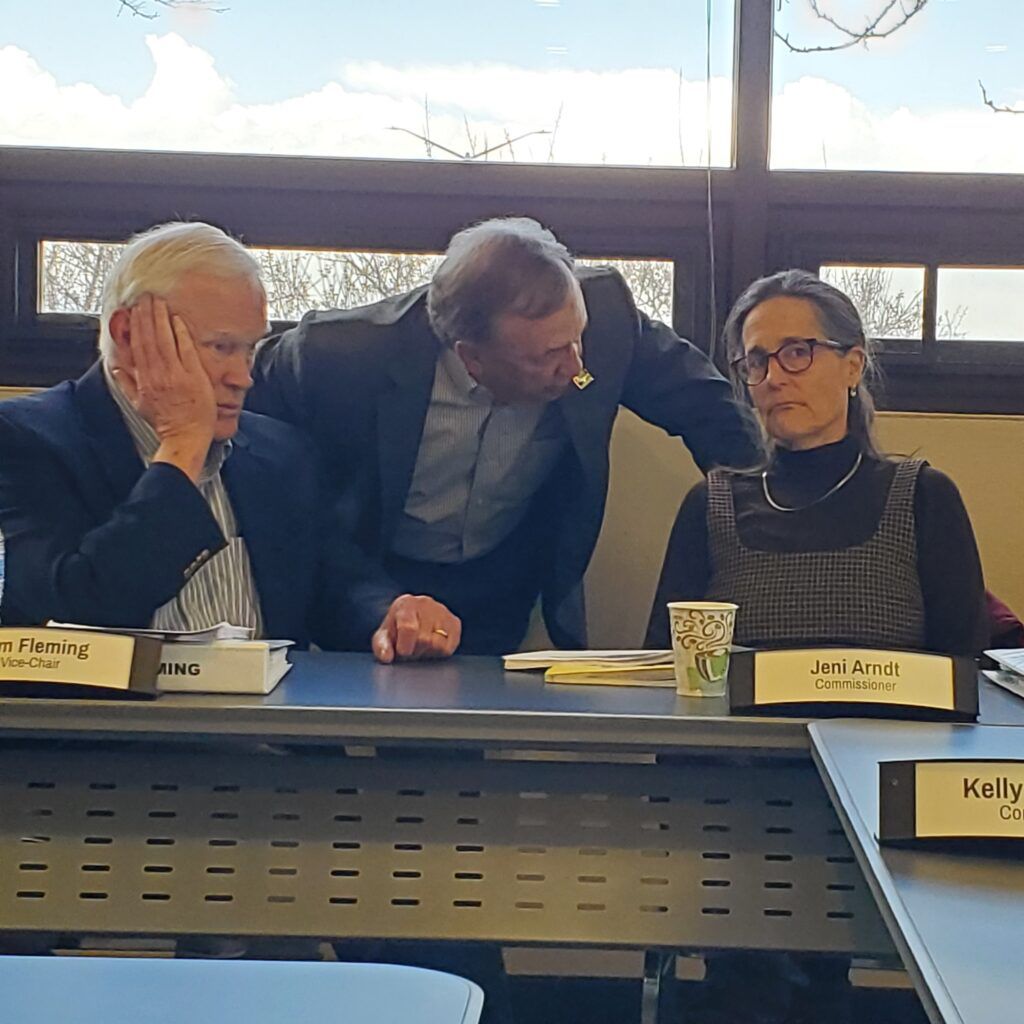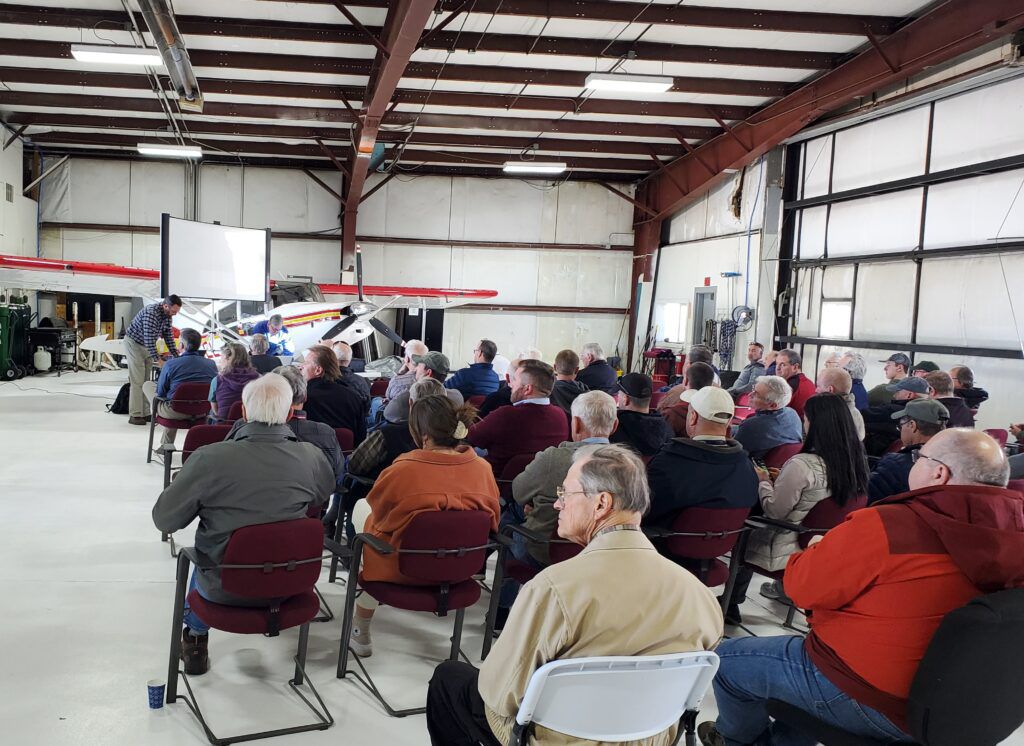Displaced NoCo aircraft owners buy more time
LOVELAND — Dozens of owners of private aircraft who suddenly found themselves facing eviction when the Northern Colorado Regional Airport Commission decided to decommission four hangars will have more time to figure out alternatives after persuading the commission on Thursday to move the lease-termination and eviction deadlines back a month.
Voting unanimously to approve a motion by commissioner Jerry Stooksbury, who said “we’re moving too fast for reasons that need to be better understood,” the panel moved the lease expiration date on the affected hangars from April 1 to June 1 and the deadlines for eviction from May 10 or July 10 to June 10 or Aug. 10.
“Thirty days is just not that much time to pull together all this work, engaging a second opinion or a more detailed first opinion,” Stooksbury said. “Let’s put the entire process on hold, moving everything 30 calendar days down the road.”
The decision came after the panel heard an alternative plan presented by a representative of the tenants — even though that presenter, Richard “Rick” Turley, expressed frustration that he was flying blind when he crafted his proposals because he had no idea whether they were compatible with the concerns the commission heard in executive session at a special meeting called March 2 before voting unanimously to order the evictions based on what it called “safety” concerns.
“I find that to be the real challenge with the proposal we’re trying to make,” Turley said after the meeting. “We’re asked to create a proposal which mitigates issues around safety and liability, and a lot of the drive for this has apparently come out of an executive session which we’re not privy to and have no minutes from. And you heard today in the meeting that the council can’t share it with us. So it’s difficult for us to understand what our proposal needs to include in order to satisfy the concerns that the commission has raised.”
Noting that the airport is co-owned by the cities of Loveland and Fort Collins, Turley said, “I went down a little bit of a rat hole trying to get information from the risk-management departments and the attorneys of the two cities, not realizing they were not at liberty to talk to me. So I was waiting on return phone calls, return emails, to try and understand what the requirements were. Once I realized that I wasn’t going to get that information, that they weren’t able to speak with me, then I just took the best guess for what the problems were and how we could mitigate them.”
Turley, who in the two weeks since the announcement had used that best guess to observe some of the hangars along with a structural engineer, enumerated some flaws he said could be easily repaired to extend the hangars’ life — things such as missing or corroded nuts and bolts and loose tie rods.
“There’s nothing here that can’t be fixed,” he said. “What you’re observing is deferred maintenance that should have been done normally over time.
“The solution we all felt as hangar tenants was to ask an engineering team to take a look at these from a different perspective — first off, a more thorough perspective, look at all the affected hangars, and secondly, with an eye toward safety.”
Speculating that the executive session had to do with liability, Turley urged the airport and the cities to perform ongoing maintenance and inspections. “Once we’ve ensured that it’s safe, liability should not be an issue,” he said. “The city would like to retain the revenues associated with the hangars, so the cities could provide liability coverage for it.
“If the cities are uncomfortable with that, the counter-proposal we would have as hangar tenants is to form an association just like each of the other tenants’ associations that exist on this airport’s grounds, take over ownership of the buildings, secure our own liability insurance that indemnifies the cities, and manage it like the other owners’ associations.
“It’s very easy in my mind, pretty straightforward, to get to the safety end of it,” he said. “We perform an engineering analysis, we conduct a study, we get a plan and we execute it. We take the steps necessary to ensure the safety of the buildings. Then it’s a matter of choice before the commissioners and before the cities: Would you like to maintain the hangars, retain ownership and enjoy the rents or would you prefer to reduce the liability for the cities, transfer it to the tenants, let us take them over as a tenants’ association.”
Turley concluded by asking the commission to “please change your mind. Delay cancellation of the leases so we can go ahead and continue to make progress on this plan. Second, allow us some feedback and input. What are the issues associated with risk management? What do we need to do to satisfy those needs? We can’t come up with a plan to satisfy the needs if we don’t know what the needs are, so please communicate and let us know what those are.”
The airport’s 2020 master plan had said the hangars were due to be replaced in 2025 or 2029, he noted. “As tenants we felt we had an opportunity to be in those hangars for quite a while. So we’re going from a situation where, in our minds, we had five to 10 years to solve the problem of these hangars reaching ‘end of life’ and us moving out; now we were faced with a few months” — at a time when waiting lists for hangar space at other airports along the Front Range are as much as eight years long.
The airport had commissioned Fort Collins-based Ditesco Project and Construction Services to identify the hangars’ useful lifespan for planning purposes. Airport director Jason Licon said the report’s findings led to the commission’s determination that certain defects in some of the hangars “couldn’t be retrofitted to adhere to current building standards or codes or be able to meet the service-life extension that we were seeking to create.”
However, Turley stressed that the report “was never intended to address the issues of safety or liability” and had made assumptions based on “a very small sample size.”
In a special meeting called with three days’ notice on March 2 and after the executive session, the commission ruled that the leases on the four hangars would expire on April 1, less than a month later, and that planes would have to be evicted May 10 for two of the hangars and July 10 for the remaining two.
The commission heard frustration with the sudden decision and lack of information echoed in comments from hangar tenants who attended Thursday’s meeting. One wondered where his rent money was going if not for maintenance, and a later email to BizWest from a pilot who didn’t want his name used asked, “If an emergency meeting had to be held two weeks ago in a never-before morning session with only three days’ notice because of the looming catastrophic consequences and without one public comment, moved into executive session, then came out with the conclusion to evict all these pilots, how could they cavalierly vote today to simply back up evictions 30 days without an executive session? If the liability was ‘grave’ two Tuesdays ago, what changed?”
Howard Abraham, who told the panel Thursday that he has attended its meetings for around 50 years, said “I’m extremely concerned with the secrecy I hear. This level of secrecy is usually reserved for if we’re about to be attacked by an enemy from another country; I don’t understand what the elephant in the room is. I’m trying to imagine, after all I’ve heard, what could be this big?”
“You’re bringing up part of the issue I’ve got in terms of being able to make an acceptable proposal — that there is information available that I don’t have access to and that I can’t react to and I can’t propose alternatives to,” Turley told the panel. “So if there is any way we could expedite getting enough information that we can create a response, we would like to have that.”
Commission chairman Don Overcash defended the panel’s decision as being made for “very sound reasons based upon information we received in executive session. We did not want to take the action we took at the last meeting,” he said. “It was very uncomfortable, and I think you can see that from all the responses. I’m very frustrated that information we received can’t be released, but the legal and risk-management teams from both cities provided us with very good direction.
“That does not preclude us from going back to re-engage with cities’ staff and with you and try to see if there’s a way we can work with this to some degree,” Overcash said.
After the meeting, he said the decision was made based on “legal, ethical and moral” grounds.
Loveland deputy city attorney Vincent Junglas noted that the panel did have the prerogative to disclose details of an executive session, but added that there are “legal risks associated with doing so. To the extent that there was legal advice provided in the executive session that was related to the eviction of the tenants, that legal advice is protected under Colorado law, and that is the reason why we have executive sessions.”
To consider Turley’s alternatives, Licon said, “we’re going to have to talk to the cities’ legal and risk departments to make those determinations. It’s not something we as an airport can do. It’s city-owned, so it’s up to the two cities to make that decision.”
However, he added, “We’re going to hit the ground running. We’ll support Rick as best as we can.”
Source: BizWest




